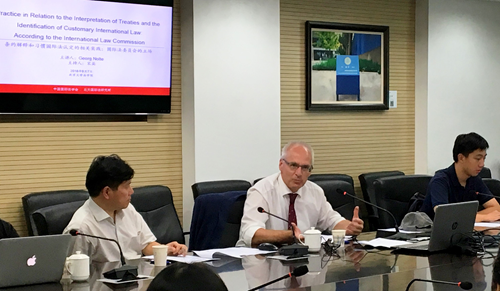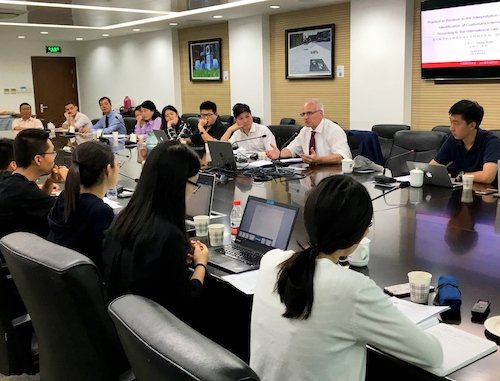Professor Georg Nolte visited Peking University Law School and successfully organized the lecture
Date:2018-11-20
On the afternoon of September 7, 2018, Georg Nolte, professor of international law at Humboldt University in Berlin, visited Peking University Law School and successfully organized the relevant practice of “Treaty Interpretation and Customary International Law: International Law Commission Guest lecture on the theme of "position". The lecture was jointly hosted by the China Society of International Law and the Institute of International Law of Peking University, and was hosted by Song Ying, deputy director of the Institute of International Law.

Professor Nolte is a professor of international law at Humboldt University in Berlin, Germany, and a member of the United Nations International Law Committee (2007-present, chaired in 2017, and served as the special rapporteur on “post-contractual agreements and subsequent practice related to treaty interpretation”). He was the President of the German Society of International Law from 2013 to 2017 and an associate member of the Institute of International Law (Institut de Droit International). He is also a founding member and co-chairman of the Berlin/Potsdam research project “International Rule of Law: Rise of Decline?”.
Professor Nolte first introduced the sources of authority and historical development of the United Nations International Law Commission for the progressive development and codification of international law. In accordance with Article 13, paragraph 1, of the Charter of the United Nations, the United Nations General Assembly decided in 1947 to establish the International Law Commission to promote the progressive development and codification of international law. At the beginning of the establishment of the International Law Commission, the institution had proposed an extremely optimistic and ambitious plan to complete the compilation of all existing international law within 20 years. Practice has proved that this goal has not been achieved so far. The International Law Commission ushered in the climax of its codification work in the 1960s and 1970s: the preparation and opening of the Vienna Convention on Consular Relations, the Vienna Convention on Diplomatic Relations and the Vienna Convention on the Law of Treaties were all completed at that time. Professor Nolte pointed out that the prosperity of international law as a form of treaty is one of the results of the decolonization movement. Newly independent countries urgently need written international law to clarify legal rights and obligations. However, after entering the 21st century, the last time the United Nations Member States accepted and opened the work of the International Law Commission as a treaty was the 2004 Convention on Jurisdictional Immunities of States and Their Property, which has not yet entered into force. However, these facts do not indicate that the work of the International Law Commission is no longer important. Many of the provisions of the Draft Articles on Responsibility of States for Internationally Wrongful Acts adopted by the Commission on second reading in 2001 were frequently applied by the International Court of Justice as customary law. In recent years, the results of the work of the Commission have also changed in form. For example, the two topics “Identification of Customary International Law” and “Treaty Interpretation” are the results of work in the form of draft conclusions, which in the past were often submitted to the UN General Assembly as draft results. The six committees discussed it. Professor Nolte particularly emphasized that these conclusions are based on the practice of senior international law experts and do not only have the suggested effects.
Subsequently, Professor Nolte began around the two topics of the International Law Commission “After the Treaty Interpretation Related Post-Conventions and Post-Convention Practices” and “Identification of Customary International Law”. Both of these topics deal with the core issues of international law, both of which were completed in the 70th session of the United Nations International Law Commission in Geneva in August this year. The International Law Commission began to select topical studies on the general topic of “identification of customary international law” and “treaty interpretation”, in part to respond to international law and the fragmentation of international judicial institutions. The rapid development of international social practice has produced many new fields and has produced many international courts with different functions. In this regard, Professor Nolte pointed out that the fragmentation of international law is not a process of breaking down from a complete whole into many smaller units, but in the development of the international community or international law, many small units grow like a flower, The process of finally releasing flowers.
Finally, Professor Nolte introduced his topic “Treaty Interpretation” as Special Rapporteur. He believes that treaty interpretation is not a mechanical process, it is an art, not a science. Even if the interpretation of the treaty is both art and science, this art is by no means purely free will. Article 31 of the Vienna Convention on the Law of Treaties sets out the five elements to be considered in the interpretation of the treaty: the text of the treaty itself, the context including the preamble and annexes, the purpose and purpose of the treaty, and subsequent agreements and subsequent practice. Professor Nolte believes that treaty interpretation is an inseparable integrated process, and all five elements must be considered. Experts in international law must be convinced that there is a single interpretation of conclusions under certain conditions. This conviction is not just a verbal claim, but a treaty interpretation is not just a word game. He highlighted the definition of the subsequent agreement and subsequent practice referred to in the fourth conclusion of his report. He pointed out that the country-centered path is embodied here. Although the subjects of international law are becoming more diverse, the Special Rapporteur still adopts a more conservative attitude here. The conclusions of the “Identification of Customary International Law” report are similar. They advocate that customary international law consists of two elements: state practice and legal conviction, and mainly focuses on the practice of the state, while also taking into account the practice of international organizations to a certain extent. Professor Nolte also pointed out that the word "identification" is considered from the perspective of a judge. While the dynamic dimension of the “formation” of customary international law is equally important, it is a dangerous practice to use the “trend” of international law for argumentation. The word “trend” means that the future will be formed, but we cannot predict the future of international law.

In the on-site question and communication session, the teachers and students participated in the “Future Trend of the International Law Commission Issues”, “The Impact of Non-Governmental International Organization Practices on the Identification of Customary International Law and Treaty Interpretation”, and “National Practice in the Process of Identifying Customary International Law”. The double calculation of materials (double counting, the same material is regarded as both national practice and legal conviction) has been actively questioned and commented. Professor Nolte answered them one by one and had a heated discussion with the teachers and students.
Professor Gong Yingchun from the Department of International Law of the School of Foreign Affairs, Professor Yang Guohua from the Law School of Tsinghua University, Professor Cai Congyan from the Law School of Xiamen University, Professor Liao Shi from the Law School of Beijing Normal University, Professor Wang Heng from the Law School of the University of New South Wales, Australia, Teacher Zhang Zhiyong, Teacher Chen Yifeng, etc. Participated in the lecture.



